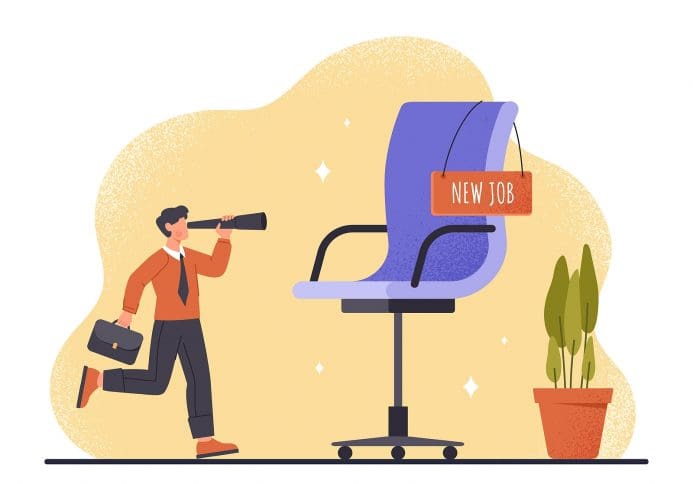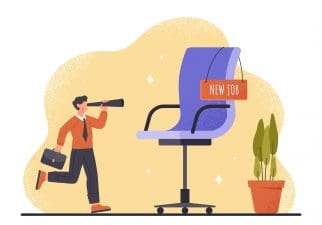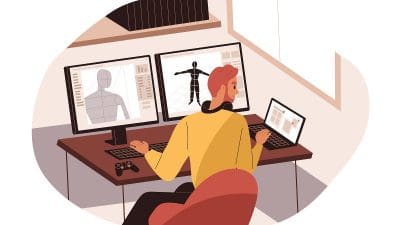
Coming out of our post-pandemic haze, people have been searching for meaning…and a new job. Having experienced remote work and forced separation from office life, many employees are now awakening to the state of their workplaces. They’re seeing, for the first time, how toxic their environments might be, and some have felt sudden bursts of clarity about what they do—and don’t—want for their long-term careers.
But for others, that clarity soon dissipates, only to be replaced by doubt. The job market can be incredibly overwhelming. What if you get rejected? What if you change your mind? Do you have the right training or skills?
Also on Mediabistro


Why the fear of the unknown holds us back from career moves
Why are so many of us struggling to make career moves right now? Simply put, change is everywhere. We feel an acute need to evolve to be ready for the next stage of our lives, yet fear holds us back.
This problem goes back to an old evolutionary function of the brain. In order to survive, it was wise for early humans to stay still. Avoiding predators, predicting the weather, and locating food were all vital activities that rewarded constancy rather than change. Our brains are hard-wired to protect us, which meant avoiding the unknown long ago in our evolutionary past.
Uncertainty itself can be uncomfortable. One study showed that when presented with an action that might or might not produce an electric shock, participants felt greater levels of discomfort when there was a 50 percent chance of a jolt than when they faced a 100 percent chance. That’s why it is common to see people staying in less-than-inspiring situations. We will continue to endure and suffer silently in the known versus pursuing the unknown.
A friend of mine recently transitioned out of the workforce into entrepreneurship and suffered a significant phase of doubt. No matter how exciting the potential new life was, the old life was a known quantity; he knew it would allow him to continue paying his mortgage and taking care of his family. Moreover, our jobs become so tied to our identities. When we decide to move on to new opportunities, we’re really saying goodbye to part of ourselves.
How to evaluate whether you’re ready for a career move
What you need is a system you can use to help you assess whether you’re ready for a career change. Luckily, there are a few questions we recommend asking that should give you more insight into whether your excitement trumps your fear:
1. Is the grass greener?
Roleplay the career move you’re thinking about. The grass over there might not be as green as it seems in your fantasies as you sit at your old desk answering emails. Remember, that patch of grass will have emails, too.
As you’re roleplaying, imagine the worst-case scenario as well. What could a bad day look like in this new career? If the answer horrifies you, it might be a sign that you should take some more time to consider your options.
2. Can you get the fulfillment you seek elsewhere?
You don’t necessarily need to make a career leap to find what you’re seeking. A greater sense of purpose? A creative atmosphere? A better social network? You might be able to scratch those itches by looking outside your career and making changes there instead.
The cliche rings true sometimes: We do not have to live to work. We can work to live. If you’re feeling uninspired, that’s okay. You can pursue other activities to help, from reading a good book to going to therapy to taking a trip.
3. Do you understand your nonnegotiables?
To assess a future opportunity accurately, you need to understand what elements of work are must-haves. This includes recognizing the good things that your current job is giving you.
When a new opportunity presents itself, it can sound terrific just because it’s new. Say the new job offers a spectacular perk, free gym membership, or loads of travel; make sure those shiny new offerings are actually checking important boxes for you.
4. Does a career change suit your long game?
A good friend of mine enjoyed a long career in the Navy, cooking for lieutenants and traveling the world. After 20 years, he’d had enough and transitioned from cooking to supply chain management. Even though that move seemed strange to other people, how he made the transition made perfect sense.
The soft skills and coolness under pressure he had learned in the Navy immediately got him noticed by organizations. He invested time driving to networking events and commuting to different cities, making his name known in this new field. The move worked for him because he could tap into all the skills he had learned in his career so far.
5. What’s your value?
Many of us undervalue ourselves and go into the job-seeking process with far more timidity than we need to based on our accomplishments and skills. We can devalue our résumés because we’re stay-at-home parents or because of that gap when we were sick.
Now’s the time to remember how valuable you are. Surround yourself with people who can remind you how great you are in your interview preparation.
If you have a trusted process for evaluating potential career moves and can use it to ask questions about your inner intentions and expectations, then you don’t need to be ruled by fear. You can let go and leap into the next challenge, despite your evolutionary self begging you to stay put.










